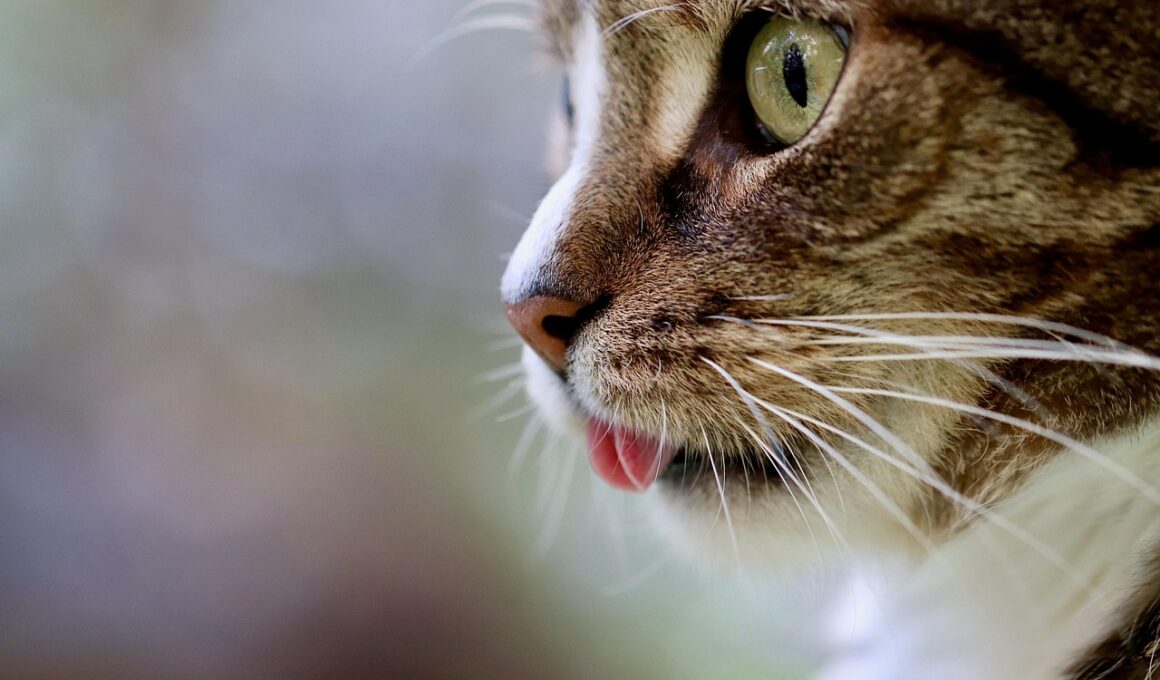The Debate over Annual Booster Shots: An Ethical Analysis
The topic of cat vaccinations often sparks healthy debates among veterinarians, pet owners, and animal rights advocates. One contentious issue is the necessity of annual booster shots. While many veterinary professionals recommend yearly vaccinations, others advocate for a more individualized approach, which considers a cat’s health history, age, and lifestyle. The ethical dilemma arises when weighing the health benefits against potential risks. Vaccinations can protect against numerous diseases, but some cats may face adverse reactions to these shots. A good veterinary practice involves careful assessment and discussion with pet owners, ensuring that any vaccination plan aligns with the cat’s best interests. Open discussions about evidence-based practices are essential, where cat owners can voice concerns or preferences. Furthermore, advocacy for reducing unnecessary medical interventions is growing, based on the principle of “do no harm.” Addressing these concerns requires transparency from veterinary practices regarding potential risks associated with booster vaccinations. Owners should be informed of both benefits and risks, empowering them to make educated choices about their cats’ healthcare. Ethical treatments must always prioritize animal welfare alongside responsible decision-making in their health management.
Another significant consideration in the debate over cat vaccinations involves risk assessment and managing potential side effects. Vaccination can lead to both common and severe adverse reactions, ranging from mild localized irritation to more severe immune-mediated reactions. Understanding these risks is paramount for veterinarians when discussing vaccine protocols with pet owners. Ethical veterinary practices advocate for balancing potential benefits against these risks. For instance, certain cats may not require annual boosters based on their exposure risk, underlying health conditions, or prior vaccine responses. There is ongoing research on the duration of immunity provided by vaccinations, indicating that some vaccines might confer protection for several years, questioning the necessity of annual shots. Therefore, discussions on vaccination frequency should be based on evidence and tailored to individual cats. A personalized approach to vaccination can helps alleviate concerns from owners already worried about possible vaccine complications. Providing educational resources alongside professional opinions is essential for empowering cat owners. The decision should never purely rely on tradition but be rooted in the most current scientific findings, ensuring ethical treatment methods maximize well-being while minimizing risks to the cats.
Owner Education and Awareness
Educating cat owners about vaccination protocols, including booster shots, is vital in navigating these ethical concerns. Providing clear, accessible information facilitates informed decision-making. Veterinarians should offer comprehensive consultations, ensuring owners understand the science behind vaccinations, what diseases their cats are protected against, and potential side effects. Perhaps most importantly, discussions should cover the implications of vaccination on overall public health, since vaccines help prevent disease transmission within communities as well. Public awareness campaigns might address how *feline panleukopenia* or *feline leukemia virus* pose significant threats not just to individual cats but also to collective feline health. This education can inform owners about regular health checks and proactive care. Additionally, involving reputable sources, like veterinary associations, can help disseminate scientifically-backed information. Facilitate open communication with pet owners about their experiences with vaccinations. Discussions should include personal insights on how an individual cat has reacted to vaccinations in the past, establishing a balanced perspective. Through education, owners can weigh risks and benefits effectively, establishing a foundation for responsible and ethically-sound healthcare decision-making for their cats.
Furthermore, awareness of local laws and regulations regarding vaccinations plays a role in ethical considerations. Various jurisdictions have different requirements for vaccinations, which may have implications for cat owners. Some regions may mandate annual booster shots due to local outbreaks or other public health concerns, shaping the landscape of cat vaccination strategies. For ethical veterinary practice, it is crucial to balance compliance with the law and individual cat welfare. In some cases, a rigid adherence to vaccination schedules may not align with best practices from a health standpoint. This divergence between law and optimal healthcare guidelines generates a unique ethical challenge. By keeping informed about local regulations, veterinarians can guide pet owners in making choices that satisfy legal requirements while prioritizing health. Additionally, advocacy for updates in vaccination laws may be necessary, reflecting advancing research in veterinary medicine. Collaborating with veterinary committees to influence local policy can promote animal welfare. Ultimately, ethical considerations in cat vaccinations must encompass legal aspects alongside safety and health strategies. A thoughtful approach ensures that regulations evolve in harmony with best practices, fully supporting feline health and well-being.
Holistic Approaches to Feline Health
The ethical considerations surrounding cat vaccinations should incorporate a holistic view of health. Understanding that vaccination is just one aspect of overall feline well-being is essential for any responsible pet owner. Veterinary care encompasses a combination of vaccinations, nutrition, preventative care, and environmental factors. Integrative approaches considering lifestyle, behavioral, and environmental elements contribute to a cat’s immunity and health. Pet owners who engage in holistic care are more likely to make informed vaccination choices. Emphasizing preventive healthcare alongside vaccination schedules creates a more comprehensive viewpoint. This perspective fosters responsible ownership and focuses on enhancing life quality for cats. As such, veterinarians should encourage holistic practices within their communities. Strategies could involve promoting regular exercise, mental stimulation, and proper diet, harmonizing vaccination plans with all aspects of a cat’s life. It also nurtures a better bond between cats and their owners, as proactive owners often closely observe changes in behavior and health. Ultimately, this multifaceted approach to animal welfare is integral to ethical discussions about vaccinations and broader veterinary practices, ensuring that feline health and happiness receive adequate attention.
Involving cat owners in the vaccination discussion promotes a collaborative approach to healthcare. Veterinary professionals should see pet owners as partners in the decision-making process. Creating spaces for dialogue allows owners to express their concerns, ask questions, and provide valuable insights regarding their cats. This level of engagement nurtures trust and may lead to more compliant clients regarding suggested vaccination schedules. When pet owners feel heard, they are more likely to adhere to vaccination recommendations and follow up on routine check-ups. Transparency in communication reinforces the ethical obligation of veterinarians to prioritize animal welfare. Providing clear, concise explanations about vaccination importance, supplemented with visual aids or pamphlets, can enhance understanding further. **Informative resources** could highlight vaccination success stories, showcasing the positive outcomes vaccinations can yield. In an ethically driven practice, veterinarians should also acknowledge varying belief systems among pet owners regarding vaccinations. Engaging with owners who hold differing views respectfully fosters inclusivity and understanding, potentially leading to successful compromise solutions adaptable for each cat. Collaborative decision-making ensures that vaccination strategies align with both medical knowledge and the owner’s perspective.
Future Directions in Cat Vaccination Ethics
Looking ahead, the future of cat vaccinations will continue evolving as research advances, impacting ethical considerations. Ongoing studies may reveal new insights into the duration of immunity and the safety of vaccinations. As science advances, veterinary practices must adapt their recommendations accordingly, ensuring they remain informed and relevant. Ethical discussions will need to incorporate these emerging findings and their implications for cat health. Innovating vaccination technologies may also enhance therapy effectiveness and safety, potentially leading to reduced frequency requirements. Veterinary professionals should embrace continuing education to integrate the latest knowledge into their practices. Additionally, fostering partnerships among researchers, hospitals, and commissions can help shape evolving protocols. As these relationships develop, communities can expect more tangible benefits in feline health and welfare, impacting vaccination strategies. Encouragingly, increased awareness among cat owners contributes to conversations around ethical vaccination practices. Engaging communities in discussions can build momentum toward responsible vaccination requirements, focusing on individual cat health and welfare. Overall, ethical considerations in cat vaccinations will require ongoing research, collaboration, and awareness to adapt willingly to the changing landscape of veterinary medicine, emphasizing the well-being of feline companions.
Ultimately, the multifaceted discussion surrounding cat vaccinations invites continual reevaluation of ethical considerations. As science, veterinary practice, and owner awareness evolve, so too must approaches to vaccination protocols. Therefore, ethical dilemmas surrounding annual booster shots will persist, necessitating a commitment to the best practices that prioritize the well-being of felines. Each pet owner’s perspective must be acknowledged, and their concerns should be integral to any vaccination discussions. Moving forward, the veterinary community should emphasize education, empathy, and informed patient care while navigating the nuances of cat vaccinations. Adapting strategies and guidelines based on individual pet circumstances ensures that medical decisions align with ethical considerations. Building collaborative relationships with pet owners will facilitate transparency and trust, ultimately benefiting the health of felines and strengthening the human-animal bond. Ethical considerations will remain at the forefront of veterinary practice, guiding the ways in which vaccinations protect our cherished feline family members. Through ongoing dialogue and advancing knowledge, the conversation regarding cat vaccinations demands both flexibility and resilience. Striving for an ethical framework will remain pivotal to the future of feline health and wellbeing in the realm of veterinary medicine.


